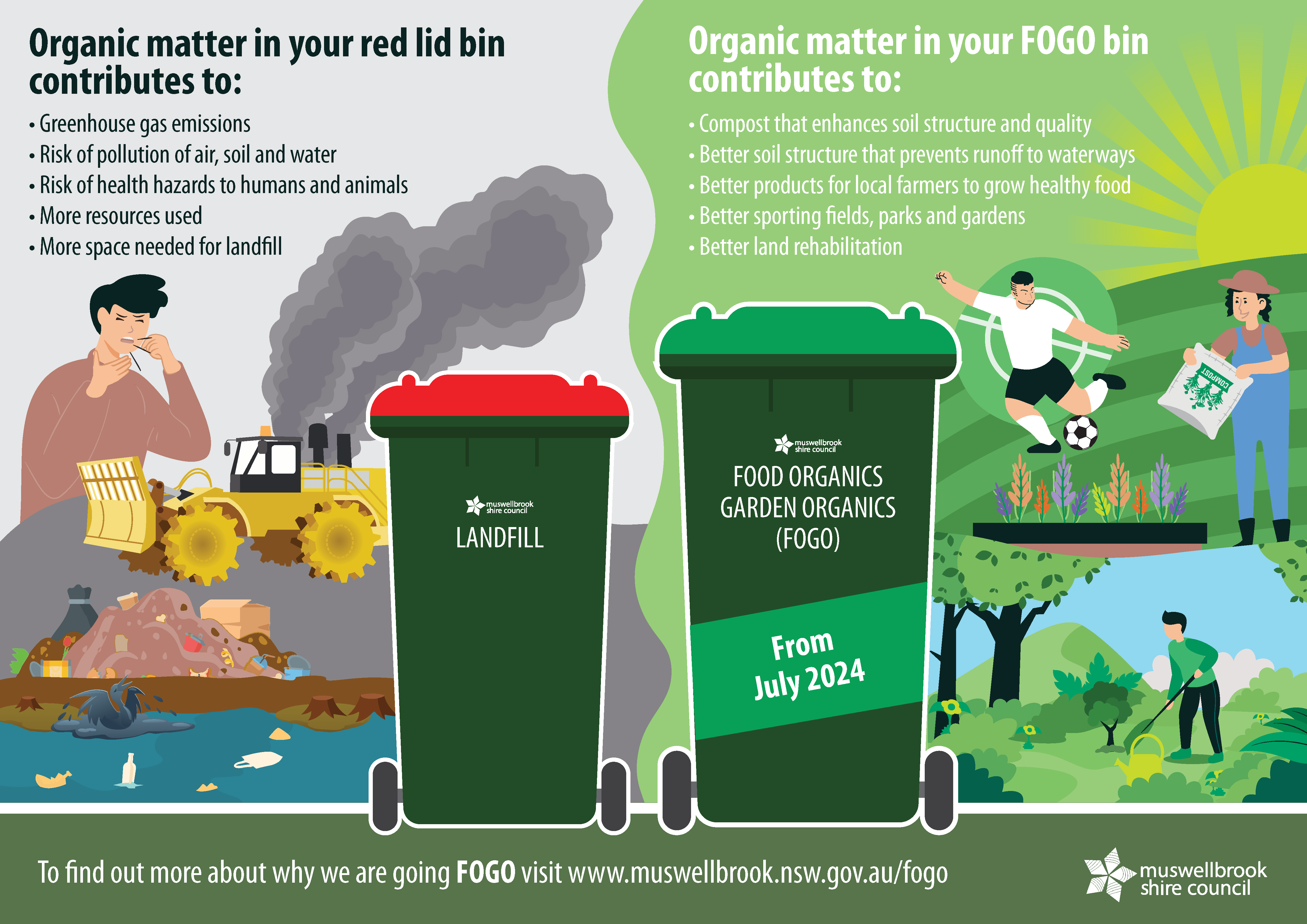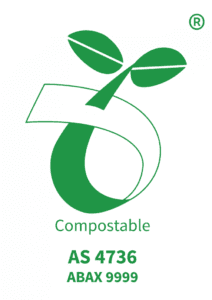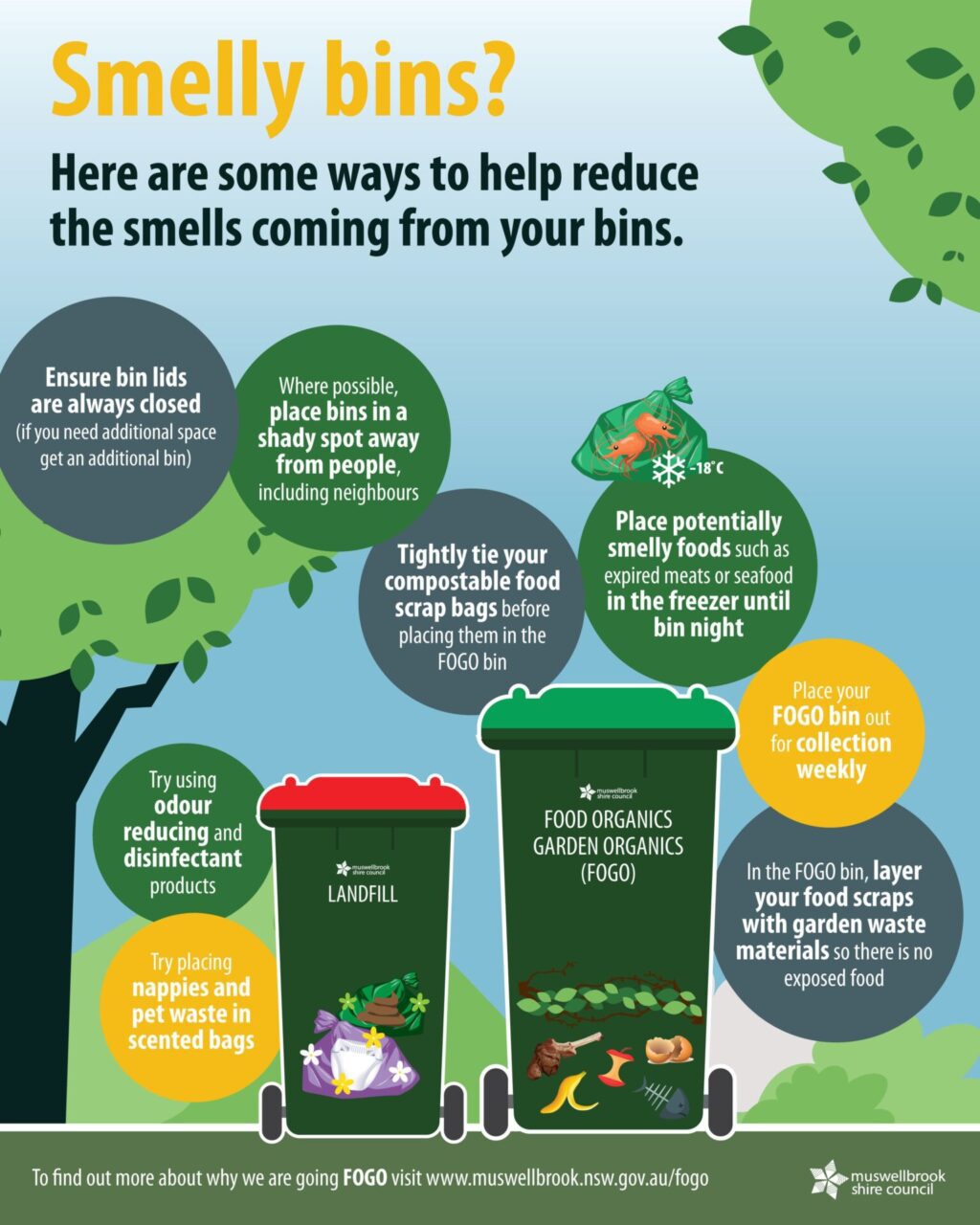Muswellbrook Shire Council transitioned the previous Garden Organics waste service to a Food Organics Garden Organics (FOGO) service from 1 July 2024. Residents can now dispose of food waste materials in addition to garden organics waste using the existing green-lid bin.
What is FOGO?
FOGO is a residential kerbside collection service that allows food organics and garden organics to be added to the green lid FOGO bin so it can be recycled into top quality valuable compost.
Green lid FOGO bins are collected weekly, while red lid general waste bins are collected fortnightly. This means that in one week the green lid and red lid bins will be put out for collection, then the following week the green lid and yellow lid bins will be collected.
How do I use FOGO?
- Place all food scraps into the kitchen caddy. Alternatively, place food scraps into the freezer until the night before your weekly green lid FOGO bin collection.
- Transfer food scraps to your large green lid FOGO bin as needed. You can also add garden organics such as grass clippings and branches – check the full list here.
- Place your green lid bin kerbside every week.
- Place your yellow OR red lid bin kerbside fortnightly. These bins alternate each week, so check your collection schedule for which bin to put out.
You may choose to clean your kitchen caddy once empty. The sink or dishwasher will work well! You may also choose to clean your green lid wheelie bin once empty. Use a garden hose, and add a little disinfectant if you’d prefer.
- Repeat!
Why FOGO?
Muswellbrook Shire Council has a long history of recycling garden organics due to the significant benefits to environmental sustainability. It reduces the amount of waste that ends up in landfill, which reduces harmful health and environmental impacts and maximises invaluable space that helps extend the life of the landfill. The organics produce a quality compost product for residents to use, which brings the waste full circle – from bin to garden and around again. With the addition of food organics to the process, all of the benefits increase and make your green bin greener!
When the 3-bin system with standard sizes and bin lid colours was rolled out in 2004-2005, Council received all the collected garden organics at the Muswellbrook Waste & Recycling Facility where staff diligently removed any non-compliant rubbish and initiated the mulching process. At the time, this process comprised hiring in a shredder and windrowing the resulting material for sale to the public. Over the following years, Council improved and invested in the processing to comply with legislation changes. The regulatory requirements from NSW EPA, based on continuing scientific research, have increased the degree to which Council must process, monitor, record and report on the output material to meet Australian Standards.
FOGO helps to keep food and garden organics out of landfill, which has many health, safety and environmental benefits:
- When organic matter such as food scraps and garden waste is buried in landfill, it is compacted with other general garbage to push out oxygen, but the lack of oxygen stops the natural composting process.
- Liquid from organic matter mixes with the general waste to create leachate, which must be collected at the landfill and safely processed to stop it entering waterways.
- Buried waste heats up to a level that causes food and garden waste to burn off carbon and release methane and other greenhouse gases into the environment. Methane is 28 times more potent than carbon dioxide, which has a significant impact on climate change, and landfill gas also contributes to smog and worsening health problems such as asthma.
- There is also a risk of the heat of buried waste generating a combustion chain reaction that, while rare, can lead to landfill fires.
Adding food organics to the green bin will also increase the quality of our compost product! While processing garden organics already makes a good compost product, adding in moisture & nutrient dense material such as food wastes will produce a much greater quality product for residents to use. We are proud of our history and the product we provide to the community, but FOGO will take us to a new level.

Everyone benefits from FOGO
For the many households who don’t have animals or the space, time or physical ability to maintain a home compost system, FOGO is an easy and sustainable way to dispose of organic waste. For those households with a home compost system, FOGO offers a safe way to dispose of more food items including meat and dairy.
The more people who compost – either at home or via the Council FOGO service – the better it is for everyone. Composting reduces harmful greenhouse gases, helps landfill to last longer and puts nutrients back into gardens and soils.
Why did Council introduce FOGO?
Bin audits showed that food waste accounted for 37.5% of the average household red lid general waste bin. This material takes up landfill space and creates harmful greenhouse gases when it breaks down. By using your green lid bin for food and garden waste, this material is turned into a valuable resource instead.
In June 2021 the NSW Government mandated that all councils must provide a FOGO kerbside collection service by 2030 as part of the NSW Government’s 20-year ‘NSW Waste and Sustainable Materials Strategy 2041’.
What happens to the material once it is collected?
The organic waste is transported by a contractor to a processing facility where it is broken down into compost in a system that ensures compliance to Australian Standards. The end result is valuable compost suitable for agricultural and domestic garden use.
An organics recycling facility will be constructed at the Muswellbrook Waste and Recycling Facility in the future to assist with the efficient processing of FOGO waste.
FAQs
FOGO service commencement
TopFOGO stands for Food Organics and Garden Organics and is the term used for the kerbside collection service that collects household food scraps and garden organics materials together so it can be processed into top quality, valuable compost.
Bin audits showed that food waste accounted for 37.5% of the average household red lid general waste bin. This material takes up landfill space and creates harmful greenhouse gases when it breaks down. By using your green lid bin for food and garden waste, this material is turned into a valuable resource instead.
In June 2021 the NSW Government mandated that all councils must provide a FOGO kerbside collection service by 2030 as part of the NSW Government’s 20-year ‘NSW Waste and Sustainable Materials Strategy 2041’.
When the FOGO service commences, you will be able to put ALL food waste, as well as garden organics waste, into your green lid FOGO bin.
Food scraps include the following:
- plate scrapings and leftovers
- expired foods (unwrapped)
- red meat, chicken, fish and shellfish, bones
- cheese and other dairy
- bread, pasta, rice
- cake, biscuits, cereals
- tea leaves (no bags or string) and coffee grounds
- eggshells
- fruit and vegetables peels
- scraps and cooking fats
Green waste materials such as garden weeds, grass clippings, fresh or dry leaves, cut flowers, pruned bushes, tree stumps and sticks can also go in.
Check our Rethink Your Waste page to learn more about what goes in which bin!
No soil, rocks, treated timber or building waste.
Garden equipment such as terracotta and plastic pots, soil bags, plant tags, string and hoses are also not allowed and should be donated or placed in the red-lid general waste bin.
No animal droppings or paper-based kitty litter.
Great to hear that you compost! The kerbside FOGO service will accept ALL food scraps, even those not traditionally put into compost bins or worm farms, such as meat and fish scraps, bones, dairy, citrus and grain products such as pasta, rice and cakes.
By all means continue to use your compost bin as you would normally, but any food scraps that you would not usually place in your compost bin can go into your green lid FOGO bin (instead of the red lid general waste bin) helping to keep all food waste out of landfill.
Waste materials from the green lid FOGO bin will be processed by an external waste contractor until a licensed processing facility is approved and built in Muswellbrook.
The organic materials from FOGO bins will be sorted to remove contamination. The materials will be processed according to Australian Standards to produce a high-quality compost, which can be used by farmers, growers and backyard gardeners!
Bin servicing frequency and rates
TopYes – rates vary for a number of reasons, with or without FOGO. The cost of processing the material and transport to an external facility will need to be accounted for in the Domestic Waste Management Charge, just like the other general waste and recycling services.
Keeping one weekly collection and one fortnightly collection keeps collection services efficient and helps manage costs for the community.
The green bin is collected weekly because food and garden waste break down quickly, and more frequent collection helps keep your bin cleaner and more hygienic.
The red bin is only for waste that can’t be composted or recycled, and the aim is to reduce what goes into it, not collect more of it.
There are ways to reduce the amount of waste going into your red lid general waste bin. Check out Council’s Kerbside Bin Guide for tips to reduce your waste.
If you still need more room, property owners may request changes to their bin service (fees apply and eligibility criteria may apply for some services). If you are a tenant of a property and need changes to the bin service, you will need to discuss this with your landlord.
For households demonstrating genuine need for altered waste services, and experiencing financial hardship, assistance in the form of a fee waiver is available by application under Council’s revised Hardship Policy.
Currently, the kerbside waste service is only available for residents who live in urban areas of the Muswellbrook LGA, paying the Domestic Waste Management Charges on their rates.
Council can consider requests from the community to extend the service area if a majority of affected households support the change and accept the charges.
Yes, property owners may request changes to their bin service (fees apply and eligibility criteria may apply for some services). If you are a tenant of a property and need changes to the bin service, you will need to discuss this with your landlord.
Call the Waste Services Hotline on 1800 312 933 to request a repair or replacement.
There are many steps to turning the organic waste into compost, and the fee to purchase the compost product is only part of the cost in the process.
As another example, we charge a fee to drop off green waste at the waste facility, to dispose of it for you, but it doesn’t cover the full cost of turning it into compost because you may not want to use the final product. Instead, we charge another fee at the end of the process to those wanting to use the Garden Improver. This way, charges at both ends ensure the total cost of the service is covered.
Council charges fees based on the costs of providing these services, and any money received from selling the Garden Improver product is invested straight back into compost generation.
Kitchen caddy, compostable bags and information pack
TopThe kitchen caddy is for disposing of food scraps and waste such as plate scrapings, expired foods and peels. You may choose to store it on the benchtop, under the sink or in the fridge, if you have room. Empty the kitchen caddy as frequently as you need to and wash it regularly with warm soapy water or place in the dishwasher.
You can order a replacement caddy using the Bin Replacement Application on our Forms page. A $25 fee applies for the 2024-2025 financial year.
Do not put any paper and cardboard items such as pizza boxes and cardboard food trays, paper towel and serviettes in the FOGO bin.
No soil, rocks, treated timber or building waste.
Garden equipment such as terracotta and plastic pots, soil bags, plant tags, string and hoses are also not allowed and should be donated or placed in the red-lid general waste bin.
Animal droppings and paper-based kitty litter cannot go in the FOGO bin.
The compostable bags are used to line the kitchen caddy. This will help to keep the caddy clean and to contain the food waste, so that it can be easily placed straight into the green lid FOGO bin outside.
No. You can put food loose into your caddy and straight into your FOGO bin. You can also line your caddy with newspaper, office paper or other uncoated paper if you prefer.
Compostable bags and housekeeping
TopCompostable bags that meet Australian Standards AS 4736-2006 (for commercial composting) are the only type of compostable bags you can use. These are available from local retailers or from Council.
There can be confusion around the difference between compostable and biodegradable bags, and using the wrong type will lead to contamination. Correct bags will have the seedling logo (pictured below) on them to indicate they meet AS 4736-2006.

Council provides up to two free rolls of compostable liners per eligible property each financial year. While we’re working on a new delivery system, you can collect your complimentary liners from Council’s Administration Centre or Denman Library.
If you need more than your free allocation, you can:- Buy approved liners from local retailers or from Council (currently $18 for a roll of 150 liners, available at Council’s Administration Centre or Denman Library).
- Use fibre-based liners (e.g. paper or newspaper) to collect and transfer food waste to the FOGO bin instead — no bags needed.
When buying from a store, look for liners that meet Australian Standard AS 4736-2006 (avoid using biodegradable bags, as they are not suitable and cause contamination). The correct bags are certified for commercial composting and marked with the seedling logo (pictured below).
Plastic bags will not compost, they lead to contamination and they are very difficult to remove from the process. The compostable bags provided by Council meet Australian Standards and are the only type that can be processed. Using other types of plastic bags, including those labelled as biodegradable or degradable, will cause contamination, affecting the quality of the finished compost product.
- Ensure the lid of your green bin is always closed
- Place the green lid bin in a shady spot, if you can
- Tightly tie your compostable bags before placing them in the green lid bin
- In the green lid bin, layer your food scraps with garden waste materials so there is no exposed food
- Place potentially smelly foods such as expired meats or seafood in the freezer until bin night
- Place your green lid bin out for collection weekly
- There are products available from local hardware stores that can assist with reducing smells and vermin.

Further information
TopCouncil’s website will be kept up to date with current information about FOGO. More information will be available as the service gets closer.
Keep an eye on the Council website/ social media posts for more information, or you can complete the FOGO Enquiry Form below to get in touch with us.
If you would like more information about FOGO please check out the NSW EPA’s webpage at www.epa.nsw.gov.au.
FOGO Enquiry Form
If our FAQs haven't satisfied your thirst for FOGO facts, use this form to get in touch!

